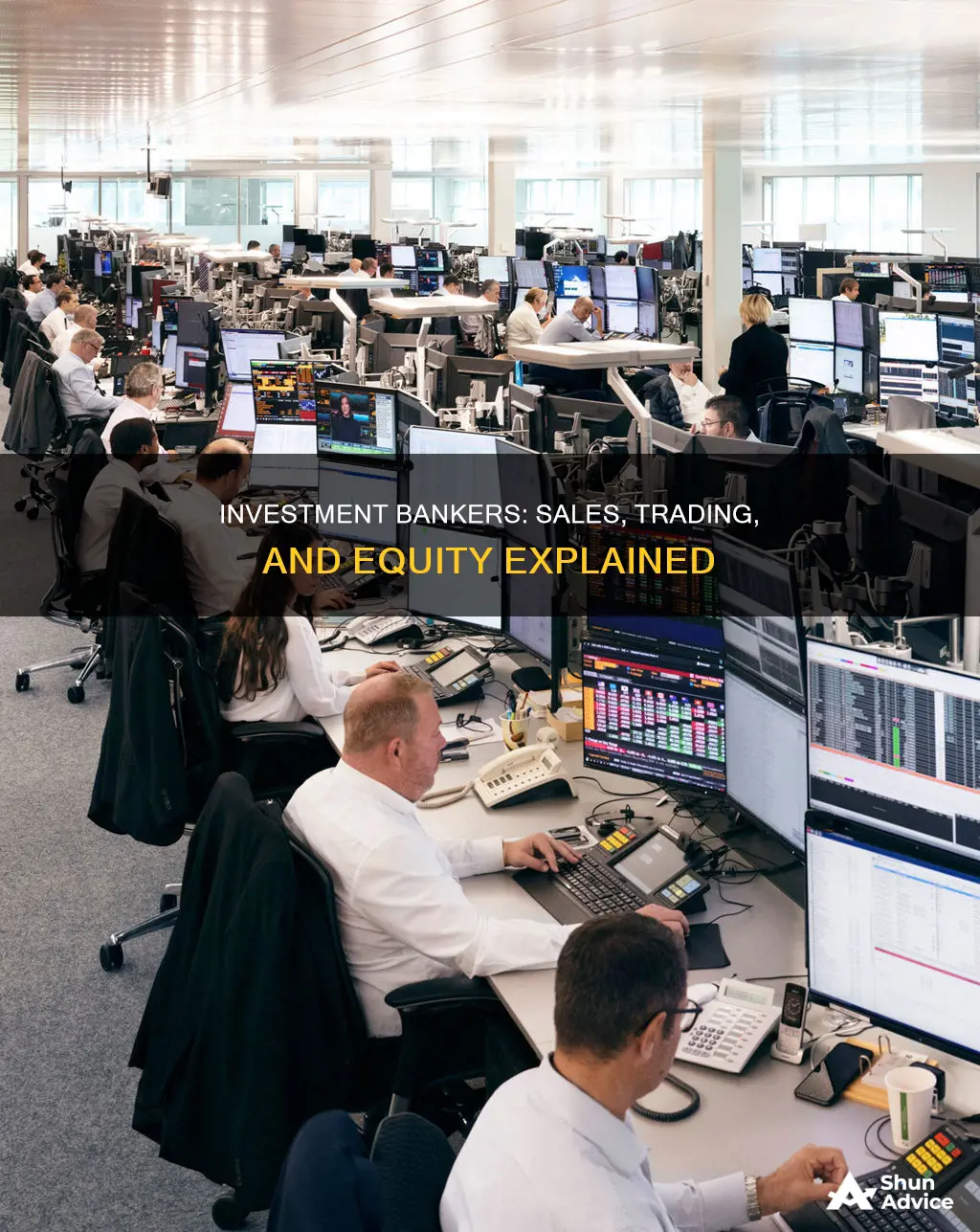
Investment bankers and traders are both involved in finance and securities, but the two professions have distinct differences. Investment bankers help clients raise money or capital through investments, whereas traders buy and sell securities and other financial instruments in capital markets on behalf of clients.
Sales and trading professionals are involved in investment banking activities on behalf of institutional investors. They oversee the buying and selling of financial products to provide liquidity to their investors. The most common type of security traded in these markets is equity, which means shares of ownership in companies.
Traders create markets for buyers and sellers and advise clients on financial positions. They represent institutional investors when buying and selling securities and trade with traders from other firms depending on the volume of stock.
Sales teams provide coverage to clients such as hedge funds, mutual funds, and other institutional firms. They are assigned certain clients and provide them with products available at their bank, such as equity research, company meetings, and access to capital market transactions.
What You'll Learn
- Investment bankers and sales and trading professionals are both intermediaries or brokers
- Sales and trading professionals work with institutional investors, such as corporate firms, governments, and other organisations
- Traders work with buyers and sellers in the bond and stock markets
- Investment bankers help companies raise debt or equity
- Sales and trading professionals work with equity, debt instruments, and derivatives

Investment bankers and sales and trading professionals are both intermediaries or brokers
However, the nature of the transactions differs. Investment bankers are concerned with large, corporate-level transactions, such as buying or selling an entire company, restructuring a company, or helping a company raise debt or equity to pay for a major expansion or acquisition. They bring together buyers and sellers via mergers and acquisitions (M&A), or they might raise money in the capital—debt (bond) or equity (stock)—markets when they sell a company to the public in an initial public offering (IPO) or when restructuring existing companies.
On the other hand, sales and trading professionals are involved in smaller transactions, which are placed by hedge fund and asset manager clients that want to trade stocks, bonds, FX, derivatives, and commodities. Sales and trading professionals help institutional investors earn money and deliver returns, while investment bankers help company management improve their businesses, expand, and adapt.
Sales and trading professionals are involved in investment banking activities on behalf of institutional investors, whether they are corporate firms, governments, or other organizations. They oversee the buying and selling of financial products to provide liquidity to their investors. The most common type of security traded in these markets is equity, which means shares of ownership in companies.
Sales and trading professionals simultaneously work to obtain clients, pitch business opportunities, and execute buying and selling for institutional clients. They work together to negotiate prices and assets to create the best portfolio positioning for their potential clients. Sales and trading professionals also offer long-term equity capital for investors in public markets such as venture capital funds, mutual funds, exchange-traded funds (ETFs), and other banks at a low price.
In summary, while both investment bankers and sales and trading professionals act as intermediaries or brokers, they differ in the nature and scope of transactions they facilitate, the types of clients they serve, and the specific activities they undertake. Investment bankers handle large, corporate transactions, while sales and trading professionals focus on smaller trades for institutional investors, providing liquidity and long-term capital.
Savings or Investing: Which Offers Better Liquidity?
You may want to see also

Sales and trading professionals work with institutional investors, such as corporate firms, governments, and other organisations
Sales and trading departments oversee the buying and selling of financial products to provide liquidity to their investors. The most common type of security traded in these markets is equity, which means shares of ownership in companies. These equity shares can come from publicly traded companies, small start-ups, or large multinational corporations.
Sales and trading teams simultaneously work to obtain clients, pitch business opportunities, and execute buying and selling for institutional clients. Salespeople market products to clients and persuade them to place trades within the salesperson's bank or investment firm. They conduct research to build a portfolio to pitch to clients that will be attractive to their business model. Traders, on the other hand, create markets for buyers and sellers and advise clients on financial positions. Both salespeople and traders work together, negotiating prices and assets to create the best portfolio positioning for their potential clients.
Sales and trading groups in financial markets offer long-term equity capital for investors in public markets such as venture capital funds, mutual funds, and exchange-traded funds (ETFs). These groups do not underwrite IPOs but must ensure that their salespeople can successfully market their financial products for different financial markets to make their organisation profitable.
Sales and trading professionals must be self-motivated, have deep knowledge of the investment industry, and have excellent persuasive skills. They need to be able to work in a fast-paced environment and have the talent to work under pressure.
Talent Management: A Strategic Investment for Business Growth
You may want to see also

Traders work with buyers and sellers in the bond and stock markets
The bond market is a financial marketplace where investors buy and sell debt securities issued by governments or corporations. Bonds are used to finance projects and operations, and they are commonly used by governments and corporations to borrow money to fund infrastructure. Bondholders lend money with interest, and they become creditors to the issuer.
The stock market, on the other hand, is where investors trade equity securities, such as shares issued by corporations. Buying equity securities means buying a small ownership stake in a company.
Traders need to have a keen understanding of the markets and patterns and must be bold and decisive, with a natural instinct about how the markets work. They usually specialize in one asset class, such as stocks and bonds, but they may also work with derivatives.
The work of a trader involves waking up early in the morning before the market opens and spending time strategizing based on news flow, economic indicators, and other factors that might influence the markets. They place trades and talk to brokers to gather market information. Post-market, traders wrap up trades, analyze positions, and set up to-do lists for the next day.
Understanding Minimum-Variance Portfolio Investment Proportions
You may want to see also

Investment bankers help companies raise debt or equity
One of the primary ways investment bankers help companies raise capital is through underwriting stocks and bonds. They buy a certain number of shares or bonds at a predetermined price and then sell them to the public or institutional buyers, generating a profit from the markup. This process involves correctly pricing the offering to ensure a successful sale and satisfy the client.
Additionally, investment bankers advise and assist companies in the process of issuing stock shares, particularly during an initial public offering (IPO) for young companies. They help prepare the necessary documentation, market the offering to investors, and manage the process of gaining approval from regulatory bodies such as the Securities and Exchange Commission (SEC).
Beyond stock offerings, investment bankers also play a crucial role in debt financing. They can arrange bond issuances for companies or governments, planning and pricing the bond issuance, completing the required documentation, and marketing the bonds to potential buyers.
Furthermore, investment bankers are skilled storytellers who can create compelling narratives to attract lenders and investors. They cultivate a vast network of active investors and lenders, creating an auction-like environment to secure favourable deals for their clients.
Overall, investment bankers facilitate debt and equity transactions, providing financial advisory services to help companies raise the necessary capital for their growth and expansion plans.
Rebalancing Investment Portfolios: Yearly Refresh for Optimal Returns
You may want to see also

Sales and trading professionals work with equity, debt instruments, and derivatives
The most common type of security traded in these markets is equity, which means shares of ownership in companies. Equity shares may come from publicly traded companies, small start-ups, or large multinational corporations.
Other types of securities include debt instruments such as corporate bonds, government bonds, mortgage-backed securities, and derivatives. Derivatives are contracts between two parties where one party agrees to pay another if something happens.
Sales and trading professionals simultaneously work to obtain clients, pitch business opportunities, and execute buying and selling for institutional clients. They work with traders from other firms, depending on the volume of stock at the time.
Sales and trading professionals in financial markets offer long-term equity capital for investors in public markets such as venture capital funds, mutual funds, exchange-traded funds (ETFs), and other banks at a low price.
Sales and trading professionals focus on specific complex products, asset classes, and regions to create investment strategies for their clients. These products range from cash equities and equity derivatives to fixed-income securities such as bonds and currencies (foreign currency exchange).
Sales and trading professionals specialize in certain trading services because these market makers need to be experts in their niche. The three main types of trades are proprietary trading, agency trading, and flow trading.
Sales and trading professionals also support other divisions within a firm. Structurers, for example, aid salespeople when their portfolio is operating around complex products. Researchers provide insights and trading ideas to salespeople, traders, and their clients.
Understanding Active Management Fees: Strategies and Costs
You may want to see also
Frequently asked questions
Investment bankers help clients raise money/capital through investments. They connect buyers with sellers via mergers and acquisitions (M&A), or they might raise money in the capital—debt (bond) or equity (stock)—markets when they sell a company to the public in an initial public offering (IPO) or when restructuring existing companies.
Traders buy and sell securities and other financial instruments in the capital markets (e.g., stock markets, commodity markets, and derivatives markets) on behalf of clients. Traders work long hours, typically starting early in the morning before the markets open and staying until the markets close.
Investment bankers have more duties than traders. They work extremely long hours, including weekends and holidays. They also play a dual role of relationship builder and financial expert. On the other hand, traders develop relationships with clients over a short time span, and trades are usually quick to develop and execute.
There are no legal academic requirements to practice as an investment banker or trader. However, some employers establish minimum education standards. Most investment bankers have a bachelor's degree in business or a math-related field, and many hold advanced degrees such as an MBA. Traders typically have undergraduate degrees in finance, mathematics, or accounting.







